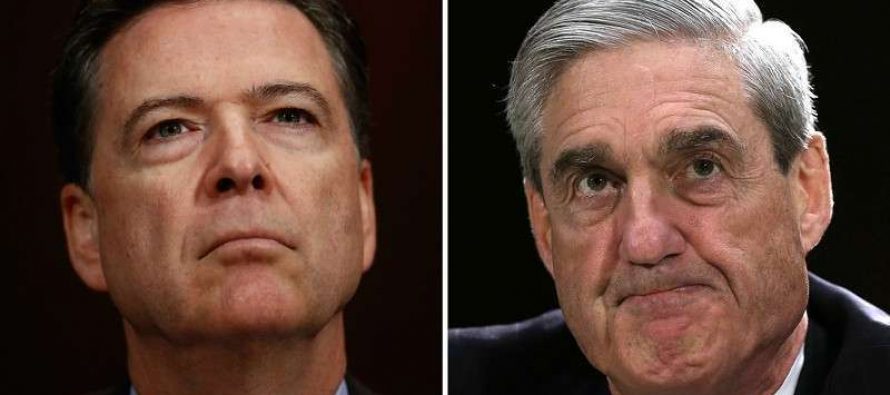
Susanne Posel ,Chief Editor Occupy Corporatism | Host of Hardline Radio Show
On May 17th, at around 2pm PST, the New York Times reported that Deputy Attorney General Rod Rosenstein announced the appointment of Robert Mueller as special counsel “to oversee the investigation into ties between President Trump’s campaign and Russian officials.”
According to Rosenstein’s statement: “My decision is not a finding that crimes have been committed or that any prosecution is warranted. I have made no such determination… it is in the public interest for me to exercise my authorities and appoint a special counsel to assume responsibility for this matter.”
This move was a complete 180 turn from previous statements 6 days earlier wherein Rosenstein did not see a need for a special prosecutor in the Trump-Russia investigation.
CNN reported that “the deputy attorney general also believes that there’s nothing he has seen at this point that would require him to recuse himself from the role overseeing the probe led by [Dana] Boente” the head of national security prosecutions who works out of the DoJ’s headquarters.
Rosenstein’s sentiment was that “FBI officials are confident that the investigation is moving ahead, despite Comey’s abrupt firing earlier this week.”
And perhaps more interesting is the timing of Rosenstein’s decision to ignore his previous stance in favor of appointing a special prosecutor. Because earlier in the day on May 17th, just 3 hours before to be exact, House Democrats announced during a press conference that they were seeking a forced vote on the House floor in order to create an independent commission to oversee the Trump-Russia investigation.
At the conference, Congressmen Adam Schiff, Eric Swalwell, Pramila Jayapal, and Elijah Cummings jointly expressed the dire need for an independent commission, saying: “This is bigger than us, this is bigger than President Trump, this is about the soul of our democracy.”
Cummings said he and his fellow colleagues were circulating a petition within the House to garner support for a vote on the creation of an independent commission styled after the one created following 9/11. He also expressed disappointment for Republicans constant refusal to allow for a “credible, robust” oversight of investigations into Trump and collusion with the Russians.
He said: “[Republicans are doing] as little as humanly possible just to claim that they are doing something. It’s unacceptable that we continue ignoring these scandals.”
Swalwell explained that the independent commission they wanted to create would be made up of “12 bipartisan appointed people, who are not members of Congress” and be imbued “with a wide mandate to search with subpoena power” to gather necessary documents pertaining to the case without fear of Donald Trump obstructing their investigation.
With a choice between growing bi-partisan Congressional support for an independent commission and the notion of a special prosecutor, Rosenstein suddenly reversed course on previous statements and saw the later as the answer to the credibility problem that the White House now faces.
This decision has unique advantages afforded to the Trump administration that an independent commission would not provide.
Neal Katyal, former acting solicitor general, explained that Mueller will not have the authority to conduct an investigation without the oversight of Rosenstein and Jeff Sessions’ department of justice.
Katyal said Mueller is “required within 60 days to submit a budget to [Rosenstein]” and the deputy attorney general will “decide on that budget” which means that it is at the discretion of the DoJ what resources are allotted to Mueller in order to conduct a special prosecutor’s investigation.
But more importantly, Mueller will have to notify Rosenstein of any “significant step” in the investigation and get approval of the deputy attorney general in order to proceed.
This solidifies the suspicion that Mueller will be able to not only act independently, but he will not be able to conduct an investigation into Trump’s ties to Russia without the direct involvement of the DoJ.
And ultimately Trump retains the power to “shut down” the investigation Mueller is overseeing whenever he wants.
Katyal explained: “Mueller is as good as you can possibly get… but at the end of the day, you know our founders gave us a system where the president does have the power to take care the laws be faithfully executed. That means that he could order the dismissal of Mueller.”
Trump left a clue as to what he expects from Mueller’s appointment and the ultimate outcome of the investigation he will now oversee in the statement released by the White House hours after Rosenstein’s announcement.
Trump said: “As I have stated many times, a thorough investigation will confirm what we already know – there was no collusion between my campaign and any foreign entity. I look forward to this matter concluding quickly.”
Source Article from http://feedproxy.google.com/~r/OccupyCorporatism/~3/J88wlghAFv0/
Related posts:
Views: 0
 RSS Feed
RSS Feed

















 May 19th, 2017
May 19th, 2017  Awake Goy
Awake Goy  Posted in
Posted in  Tags:
Tags: 
















